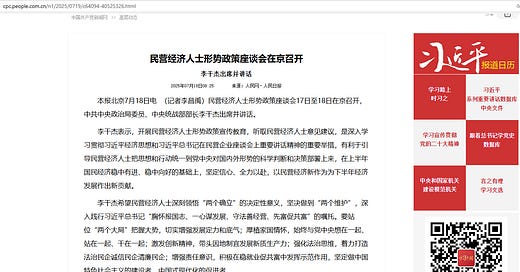No Longer Private: How the CCP Is Embedding ‘Warrior Wolf’ Ideology in China’s Private Enterprises
No Longer Private: How the CCP Is Embedding ‘Warrior Wolf’ Ideology in China’s Private Enterprises
Peggy Yuan | July 19, 2025
In July, 2025, #CCP intensified its efforts to consolidate political control over the private sector. During the Private Economy Situation and Policy Seminar held in Beijing on July 17–18, Li Ganjie, #Politburo member and head of the United Front Work Department, emphasized that entrepreneurs must align their "thought and action" with the CCP’s assessment of domestic and global challenges.
Li called on private business leaders to “stay closely united with the CCP, follow the CCP thought, stand together, and work together.”
While the official participant list remains undisclosed, figures like Ren Zhengfei (Huawei), Pony Ma (Tencent), Li Yanhong (Baidu), Lei Jun (Xiaomi), Cao Dewang (Fuyao Glass), and Wang Chuanfu (BYD) are typically involved in such high-level dialogues. Their inclusion underscores the CCP's continued leverage over China’s most prominent private entrepreneurs.
Institutionalized CCP Control: "Full coverage of CCP presence in private enterprises" (党建全覆盖)
The CCP’s political oversight of private enterprises is not a new development but the continuation of a systematic policy that has been in place since Xi Jinping rose to power in 2012. Under Xi’s leadership, the Party has mandated strict internal political integration across the private sector:
Any enterprise with 3 or more CCP members must establish a CCP Party branch (党支部).
Companies with 50 or more Party members must set up a CCP Party committee (党委).
By the end of 2018, this policy achieved near-total implementation. According to official data:
1.585 million private enterprises in China had established Party organizations (Xinhua, 2019).
92% of the top 500 Chinese companies now have internal Party committees (People’s Daily, 2019).
This milestone marked the completion of Xi Jinping’s goal of “full CCP Party-building coverage” across China’s private economy.
The CCP’s Red Hand in the Boardroom
These CCP Party committees are not ceremonial. They are embedded deeply into corporate decision-making processes and wield real influence:
Weekly ideological training sessions are mandatory for management and employees.
Strategic decisions must be reviewed for political alignment with CCP doctrine.
For Chinese firms listed on overseas stock markets, all disclosure materials, including the IPO prospectus, financial reports, earnings announcements, and corporate actions, must be pre-approved by the company’s CCP Party secretary.
This system effectively gives the CCP oversight not just of domestic business operations but also of how Chinese companies present themselves to global investors.
Implications: Beyond Corporate Control to Ideological Indoctrination
The CCP’s deepening control over China’s private enterprises has consequences far beyond corporate governance. It reshapes not only how companies operate but how employees think, creating systemic risks for global markets and political stability.
Transparency Erosion: Mandatory CCP review of all financial disclosures—including IPO prospectuses, earnings reports, and corporate actions—compromises the integrity of corporate reporting. This practice injects political censorship into financial transparency, raising serious concerns for global investors about data reliability.
Innovation Stagnation: When political loyalty trumps market logic, innovation suffers. In sectors requiring agility—such as AI, semiconductors, or biotech—the demand for ideological alignment leads to strategic distortions, bureaucratic delays, and risk aversion.
Legal and Compliance Tensions: Chinese firms listed overseas face dual compliance obligations: international regulatory frameworks and CCP political oversight. This creates inherent conflicts of interest, exposing firms to legal, financial, and reputational risks.
Militarization of Corporate Culture: Perhaps the most alarming consequence is ideological indoctrination. Weekly CCP trainings, loyalty reporting, and the integration of "Xi Jinping Thought" into business operations are not benign political exercises. They cultivate an employee mindset increasingly aligned with authoritarian narratives, often framing the U.S., Japan, and democratic societies as existential threats. This "warrior wolf" corporate culture elevates nationalism and confrontation over collaboration, embedding geopolitical hostilities into the DNA of China’s economic elite.
In short, China’s private sector is no longer just doing business, it is being refashioned as an ideological tool for the CCP’s domestic control and international agenda.
Conclusion
For global markets, this signals that China’s private sector is no longer "private”. It is now a twisted model of CCP-aligned corporate governance, where profit and integrity are behind the political obedience.
Further more, the CCP’s reassertion of control over private enterprise is not just a policy shift, it reflects a deeper ideological commitment to CCP’s supremacy in all aspects of Chinese life. As Xi Jinping’s administration faces economic headwinds, the regime appears determined to use political loyalty, not market forces, as the primary stabilizing tool.
References
Central Committee of CCP Literature Research Office. (1977). Selected Works of Mao Zedong (Vol. 5). People’s Publishing House.
People’s Daily. (1956, January 15). Completion of Socialist Transformation.
People’s Daily. (2019, January 4). 92% of China’s Top 500 Enterprises Have Party Committees. [人民日报,2019年1月4日:92%的中国500强企业设有党委。]
Xinhua News Agency. (2019, January 4). 1.585 Million Private Enterprises Have Established Party Organizations. [新华社,2019年1月4日,全国已有158.5万家私营企业建立党组织。]
Xinhua News Agency. (2025, July 18). Private Economy Situation and Policy Seminar Held in Beijing.
CCP Organization Department. (2014). Guidelines on Strengthening Party Organizations in Private Enterprises.
ByteDance Corporate Website. (2023). 党建与企业文化建设 [Party-building and Corporate Culture]. Retrieved from https://www.bytedance.com/zh/party-building
新浪网. (2023). 字节跳动党建工作纪实 [Documentary Report on ByteDance Party-Building]. Retrieved from
https://www.sina.com.cn/
Sina.com. (2023). 字节跳动招聘广告显示“党员优先”. [ByteDance Recruitment Ads Show ‘CCP Members Preferred’].




